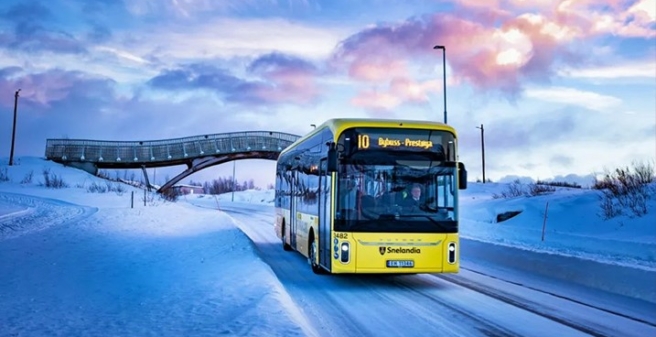The performance of battery-electric buses in harsh weather conditions has always been an issue to be observed and discussed, and just recently a number of news articles in the press did not really help to calm these concerns. Several electric bus manufacturers around the world have undertaken comprehensive tests with its vehicles under such strong winter conditions.
Norway seems to offer an ideal environment for such test operation. One-third of its territory is located within the Arctic Circle, featuring complex environment and harsh climate. Especially in its northern areas, including places like Kirkenes, where low temperature, ice and snow dominate for nearly half the year, the environment is nothing short of a rigorous performance testing ground for battery electric vehicles.

Just recently, a battery electric bus of the Chinese manufacturer Yutong underwent an extreme cold challenge in Kirkenes. Yutong communicates that In a live test of 105 km, its 12-metre e-bus model U12 with a battery capacity of 422kWh showed a power consumption of 1.56 kw/km in an ice and snow environment in Kirkenes where the temperature was -33°C. The vehicle got a special preparation for the ice and snow environment and low temperature of Norway’s climate. In order to meet the special requirements for anti-corrosion performance of vehicles in highly humid and seriously melting snow salt environments, Yutong adopts enhanced anti-corrosion technologies for core components such as the vehicle’s bearing structure and chassis frame, as well as corrosion-prone bottom areas. This measure ensures that no structural corrosion will occur during the full life cycle of the vehicle. Yutong also provides comprehensive chassis protections to prevent critical chassis parts and components from wear in harsh road conditions. All such measures are aimed at meeting the operation requirements for vehicles in a polar environment and ensuring the safe travel of residents in polar regions.
The battery of Yutong’s liquid cooling system can provide 24-hour safety monitoring. The IP68 protection system for battery, motor and electric control avoids safety accidents caused by short-time wading of vehicles. Intelligent functions, such as remote air conditioning scheduling and remote fault diagnosis, provide great convenience for the daily operation of end customers.
Since 2020, operators in Norway purchased a total of 331 Yutong battery electric buses up to now.
A similar challenges under extreme cold conditions was done on January 21, 2024, when Yutong and the No.1 Bus Company of Astana challenged the driving range of Yutong’s articulated e-bus E18PRO in Kazakhstan. In the test, the bus started with SOC of 100% and heating inside turned on for the whole process to pick up and drop passengers normally at stations, and the test ended when SOC reached 5%. Finally, the driving range of 374 km was achieved after 16 hours of operation at -25°C.
